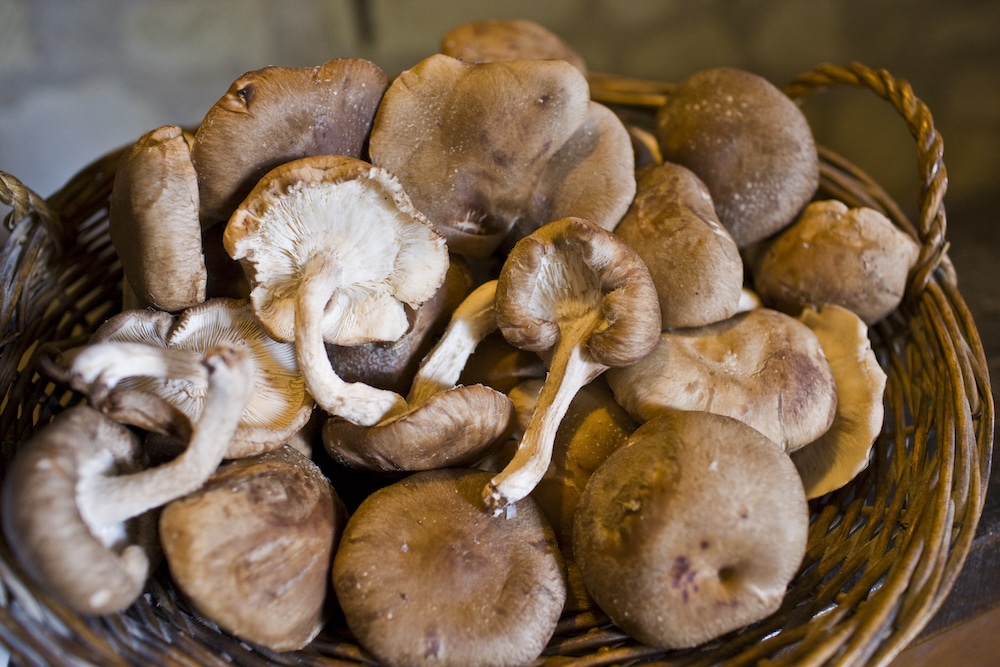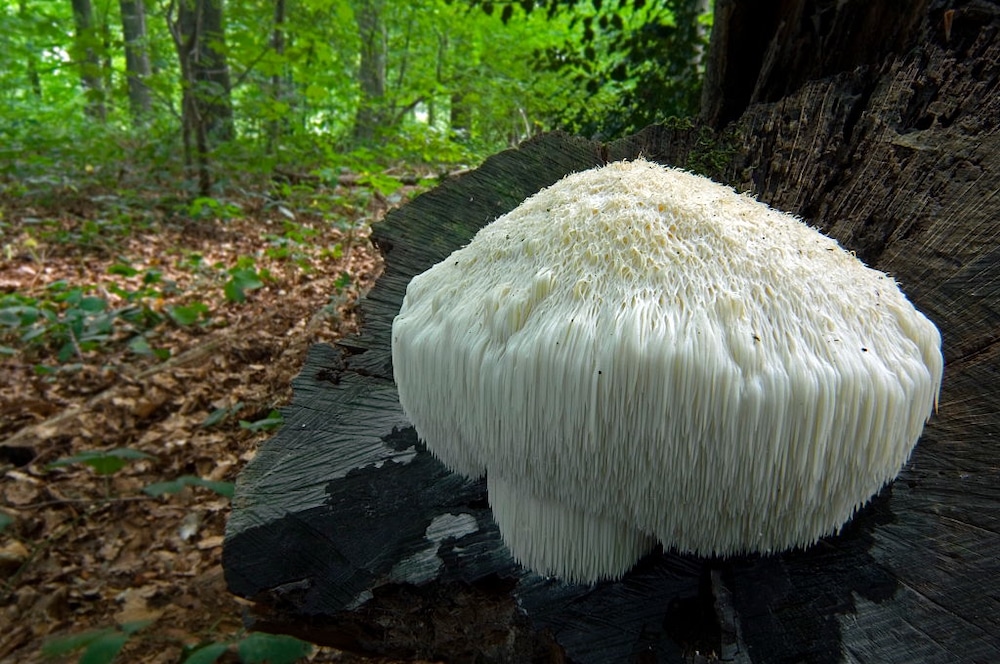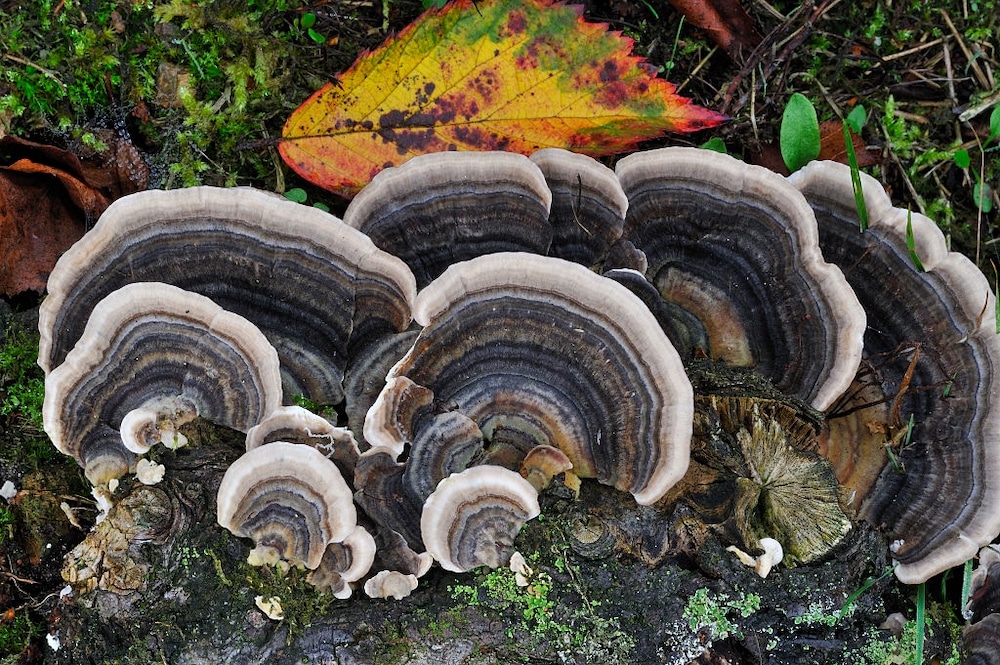
Fungi are everywhere, even if we can’t see them. There are between two and four million known species of fungi on Earth with thousands more discovered every year, and we’re increasingly recognizing their ability to address plastic pollution, climate-warming greenhouse gases, and environmental toxins. Below the soil, mycelium breaks down organic matter, and mushrooms are the fruiting body that rises above ground. Some are toxic, some are medicinal, and many have specific cultural importance. The mushrooms below are just a few of the many that have proven benefits to human health. If you’re foraging and harvesting mushrooms yourself, remember to use caution and consult foraging guides to make sure you’re collecting the right species, and doing so in a way that isn’t harmful to the ecosystems you find them in.
General Health Benefits of Mushrooms
Mushrooms are high in vitamins and minerals like calcium, iron, magnesium, niacin, potassium, riboflavin, selenium, and zinc, and are good sources of protein and fiber. They also have numerous other benefits for brain, heart, and gut health, and are even showing anti-cancer properties — long believed in traditional medicine — in emerging research.
Brain Health
A 2018 study conducted in Singapore found that participants who ate two cups of mushrooms each week were 50% less likely to develop MCI: that is, mild cognitive impairment, which includes difficulty with language and memory. The study lasted from 2011 to 2017 and involved 663 participants, who ate six common mushrooms including button, shiitake, and oyster mushrooms.
Heart Health
Mushrooms have multiple features that make them beneficial for heart health and for lowering your risk of heart-related illnesses. A high intake of sodium is associated with high blood pressure and hypertension, which can cause stroke and heart diseases. Mushrooms are naturally low in sodium — a cup of white mushrooms has only five milligrams of sodium, but they can reduce the need for salt in meals while maintaining flavor. Thus, mushrooms are a great substitute for meat — even partially — in some recipes if you’re hoping to decrease sodium levels in your diet. They are also a great source of potassium, which helps reduce the impact of sodium and relieve blood vessel tension, all of which is beneficial for blood pressure.
Gut Health
Besides their high concentrations of fiber, mushrooms provide other benefits to the gut. They are high in polysaccharides — a type of carbohydrate that helps the body grow healthy bacteria — and also act as “prebiotics,” a type of fiber that cannot be digested by the body, but is stored and fermented in the large intestine by bacteria. As a prebiotic, mushrooms stimulate the growth of microbiota in the gut.
Vitamin D and Immune Health
Mushrooms have gotten increasing attention for their immune system benefits, with their concentrations of Vitamin D being one of the many factors. In fact, mushrooms are the only sufficient produce and non-animal source of vitamin D. When mushrooms are exposed to UV light, they become higher in Vitamin D. Vitamin D helps the body absorb calcium, which is important for bone and immune health. It’s also considered a “shortfall nutrient,” meaning it’s common for Americans not to reach their recommended intake.
Cancer Prevention
Given their concentrations of ergothioneine — an antioxidant/amino acid that works to prevent and slow down damage to cells — there’s some evidence that mushrooms can decrease your risk of cancer. A review of a relatively small number of cancer studies between 1966 and 2020 found that consuming 18 grams of mushrooms per day could reduce the risk of developing cancer by about 45%. The study found that any variety of mushrooms was helpful, but shiitake, oyster, maitake, and king oyster have especially high concentrations of ergothioneine.
Five Super Beneficial Mushrooms
While fungi as a whole have tons of awesome health benefits, these mushrooms are especially known for their medicinal properties, and many have been used in traditional medicine throughout history.
Shiitake

Growing on fallen logs, Shiitake mushrooms have a long history in East Asia as both a source of medicine and food. Shiitake are high in vitamin B6, which is important for the formation of red blood cells and proteins. B vitamins in general help with cell growth, thus aiding hair, skin, and nails. Shiitakes are also high in eritadenine, a compound that can reduce cholesterol levels. That in combination with their inflammation-reducing beta glucans prevents cholesterol from being absorbed. So, if you’re struggling with high cholesterol, add some shiitakes to a stir fry, noodle or pasta dish, sauce, or over rice for a delicious and healthful meal.
Chaga

The first known use of Chaga was in 17th-century Russia, and now it’s famous for its immune system benefits. Chaga grows on birch trees in colder climates, and looks more like a rock than a mushroom. Its woody texture makes it a better candidate for tea or capsules than actual cooking, but it does nothing to diminish its benefits. It contains polysaccharides (that healthy, bacteria-growing carbohydrate) that help the body produce lymphocytes — white blood cells that help with immune response to infection. They also contain oodles of antioxidants — just one cup of chaga tea has the same level of antioxidants as thirty pounds of carrots.
Reishi

The history of reishi’s use in traditional Chinese medicine is long — its first records were from the Han Dynasty. Like many other mushrooms, their beta glucans and glycoproteins boost the immune system. Some research also points to reishi’s anti-allergy properties due to its ability to inhibit the release of histamines, which cause cells to swell and result in typical allergy symptoms like sneezing and runny noses. By reducing dermal oxidation, reishi protects your skin from wrinkling and other symptoms of aging, while also benefiting energy levels.
Lion’s Mane

Lion’s mane doesn’t look like your typical mushroom with a distinctive round, smooth cap — instead, it’s characterized by the tons of long, thin, pale strands hanging from a central body that looks, of course, like the head of a lion. In Chinese medicine, the mushroom was traditionally used for treating stomach problems with its strong anti-inflammatory and anti-bacterial properties, particularly those relating to the spleen and the gut. It was called the “spirit plant,” and was believed to promote longevity. Lion’s mane also has strong neurological benefits, and early research shows that it protects against neurological damage and prompts nerve-tissue growth. It stimulates NGF — standing for nerve growth factors — which are proteins that protect neurons and help new ones grow, and thus helps nervous systems. Therefore, it could be beneficial for people with MS, Parkinson’s, and Alzheimer’s.
Turkey Tail

Like Lion’s mane, turkey tail looks just how the name suggests, like a flared turkey’s tail. The mushroom is greatly beneficial to the immune system, especially with its high concentrations of polysaccharides and triterpenes that have immunomodulating benefits. Turkey tail also contains PSK — a cancer drug used in Japan — and PSP: two beta-glucans that regenerate white blood cells, and create and support T-cells, macrophages, and NK (natural killer) cells, all of which support the immune system.
The post 5 Mushrooms With Fantastic Health Benefits appeared first on EcoWatch.
